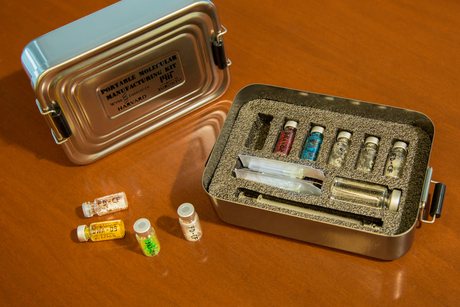Just add water: on-demand pharmaceutical manufacturing

US researchers have been working on a molecular manufacturing method that can produce a broad range of biomolecules anywhere in the world, without power or refrigeration. The result is a ‘just add water’ solution that affordably, rapidly and precisely generates compounds that could be administered as therapies or used in experiments and diagnostics.
“The ability to synthesise and administer biomolecular compounds anywhere could undoubtedly shift the reach of medicine and science across the world,” said Dr James Collins, senior author on the study. The work was led by Dr Collins’ team at Harvard’s Wyss Institute for Biologically Inspired Engineering and has been published in the journal Cell.
‘Portable biomolecular manufacturing’, as the work has been dubbed by Dr Collins’ team, hinges on the idea that freeze-dried pellets containing ‘molecular machinery’ can be mixed and matched to achieve a wide variety of products. By simply adding water, this molecular machinery can be set in motion. The approach builds on work described in a 2014 paper where the team demonstrated that transcription and translation machinery could function in vitro, without being inside living cells, inside freeze-dried slips of ordinary paper embedded with synthetic gene networks.
The new method employs two types of freeze-dried pellets containing different kinds of components. The first kind of pellet contains the cell-free ‘machinery’ that will synthesise the end product. The second kind contains DNA instructions that will tell the ‘machinery’ what compound to manufacture. When the two types of pellets are combined and rehydrated with water, the biomolecular manufacturing process is triggered. The second type of pellet can be customised to produce a wide range of final products.
Compounds manufactured using the method could be administered in several ways to a patient, including via injection, oral doses or topical application. Furthermore, the technology is applicable to a wide variety of applications. For example, since antibodies are increasingly being used to treat microbial infections and diseases ranging from cancer to immune disorders, the researchers used their system to create a portable, modular toolbox for making designer antibodies against a variety of disease-relevant targets. This included one that could neutralise C. difficile bacteria, which cause fatal infections in people, and another that was able to target and kill breast cancer cells.
Since they are freeze-dried, the pellets are extremely stable and safe for long-term storage at room temperature for up to and potentially beyond one year. The method is also cheap to deploy at roughly $0.03 per microlitre, making it about 10 times less expensive than its commercial counterpart, although the exact cost can vary depending on the molecules being manufactured.
The team envisions that the method could be suitable for remote clinics lacking an uninterrupted chain of cold refrigeration, which restricts their access to lifesaving doses of medicines. Dr Keith Pardee, a former Wyss research scientist who is currently an assistant professor at the University of Toronto, noted, “This approach could — with very little training — put therapeutics and diagnostic tools in the hands of clinicians working in remote areas without power.”
The team are also optimistic about other potential uses of this technology, including futuristic applications for long-term medical treatment during space travel. They are currently looking to adapt the platform so that it can be used in field work and educational applications, as well as to determine how the technology could be used for additional small-molecule production. Although Dr Collins admits that scalability may be an issue with certain molecules that are not immediately amenable to the freeze-drying process, his team are discussing the next steps they can take.
How cells repair toxic DNA damage
Researchers say they have uncovered the mechanism by which cells identify and repair a highly...
Sequencing tech could transform NZ viticulture
A new initiative aims to utilise genomics to breed better varieties of grapevines and hops that...
Eight babies born in UK following mitochondrial donation
The birth of eight babies with a greatly reduced risk of developing mitochondrial DNA disease...




